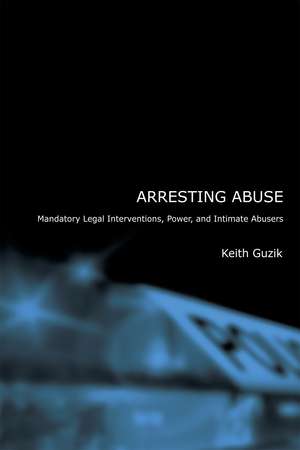Arresting Abuse: Mandatory Legal Interventions, Power, and Intimate Abusers
Autor Keith Guziken Limba Engleză Hardback – 10 iun 2009
Over the last decade, police departments and state’s attorney’s offices across the country have adopted mandatory arrest and no-drop prosecution policies to handle cases of intimate abuse. In addition to protecting victims from future violence, these policies are intended to change abusers by punishing them for their behavior. Emerging at a time when various dimensions of U.S. society are being ‘governed through crime,’ mandatory arrest and no-drop prosecution have proven controversial. While critics charge that the policies disempower women by removing decision making from them and aggravate the negative consequences of criminal justice interventions in poor and minority communities, proponents maintain that the measures are needed to protect battered women and provide them the same legal protections afforded to other victims of violent crime. Somewhat overlooked in this debate has been how mandatory arrest and no-drop prosecution affect abusers, a critical question for understanding the power of criminal punishment to combat intimate partner abuse.
In Arresting Abuse, Keith Guzik answers this question. Drawing both from firsthand observations of a police department and a criminal court following mandatory policies and extensive interviews with 30 offenders arrested and prosecuted for domestic violence, Arresting Abuse provides a critical assessment. While mandatory arrest and no-drop prosecution allow the state to extend formal legal supervision over an increasing number of violent men and women, thus seemingly increasing its power over them, offenders prove resistant to change. They see themselves as victims of injustice, continue to view their violence as justified, and devise new strategies to preserve their definition and enactment of self. The reasons for these outcomes rest in the nature of power itself—in the state tactics, structures of social inequality, and modes of individual agency through which mandatory arrest and no-drop prosecution are realized. A key contribution to domestic violence literature as well as to socio-legal scholarship on the power of the law as a force for social change, Arresting Abuse argues that the promise for defeating intimate partner abuse lies in better matching the tactics of state power to the goals of victim empowerment and offender responsibility and to exercise such force through mechanisms that do not exacerbate social inequality.
In Arresting Abuse, Keith Guzik answers this question. Drawing both from firsthand observations of a police department and a criminal court following mandatory policies and extensive interviews with 30 offenders arrested and prosecuted for domestic violence, Arresting Abuse provides a critical assessment. While mandatory arrest and no-drop prosecution allow the state to extend formal legal supervision over an increasing number of violent men and women, thus seemingly increasing its power over them, offenders prove resistant to change. They see themselves as victims of injustice, continue to view their violence as justified, and devise new strategies to preserve their definition and enactment of self. The reasons for these outcomes rest in the nature of power itself—in the state tactics, structures of social inequality, and modes of individual agency through which mandatory arrest and no-drop prosecution are realized. A key contribution to domestic violence literature as well as to socio-legal scholarship on the power of the law as a force for social change, Arresting Abuse argues that the promise for defeating intimate partner abuse lies in better matching the tactics of state power to the goals of victim empowerment and offender responsibility and to exercise such force through mechanisms that do not exacerbate social inequality.
Preț: 302.17 lei
Nou
Puncte Express: 453
Preț estimativ în valută:
57.85€ • 59.52$ • 48.76£
57.85€ • 59.52$ • 48.76£
Carte tipărită la comandă
Livrare economică 28 februarie-14 martie
Preluare comenzi: 021 569.72.76
Specificații
ISBN-13: 9780875804033
ISBN-10: 0875804039
Pagini: 248
Dimensiuni: 152 x 229 x 23 mm
Greutate: 0.52 kg
Ediția:1
Editura: Northern Illinois University Press
Colecția Northern Illinois University Press
ISBN-10: 0875804039
Pagini: 248
Dimensiuni: 152 x 229 x 23 mm
Greutate: 0.52 kg
Ediția:1
Editura: Northern Illinois University Press
Colecția Northern Illinois University Press
Recenzii
“This is an ambitious book that has important implications for our theoretical understanding of the effects of criminal justice interventions on people arrested for domestic violence and for our evaluations of the practical utility of presumptive arrest and prosecution for violence.”—Kristin L. Anderson, Western Washington University
“I have been working in this general area for more than 30 years and have recently published a book focusing on the criminal justice response to abuse. But, I learned a considerable amount from this book and found myself underlining whole passages to think more about. So it is stimulating, not merely informative.”—Evan Stark, Rutgers University
“I have been working in this general area for more than 30 years and have recently published a book focusing on the criminal justice response to abuse. But, I learned a considerable amount from this book and found myself underlining whole passages to think more about. So it is stimulating, not merely informative.”—Evan Stark, Rutgers University
Notă biografică
Keith Guzik is Assistant Professor of Sociology at Bloomfield College in New Jersey.
Cuprins
Table of Contents
Acknowledgments
Introduction
1: The Practice of Mandatory Arrest
2: The Practice of No-Drop Prosecution
3: Research Participants and Their Violence
4: Abusers' Experiences with Mandatory Arrest and No-Drop Prosecution
5: Abusers' Relation to Violence
6: Change in the Lives of Abusers
Conclusion
Appendix A: Description of Research Methods
Appendix B: Classification of Research Participants
Notes
Works Cited
Index
Introduction
1: The Practice of Mandatory Arrest
2: The Practice of No-Drop Prosecution
3: Research Participants and Their Violence
4: Abusers' Experiences with Mandatory Arrest and No-Drop Prosecution
5: Abusers' Relation to Violence
6: Change in the Lives of Abusers
Conclusion
Appendix A: Description of Research Methods
Appendix B: Classification of Research Participants
Notes
Works Cited
Index
Descriere
Over the last decade, police departments and state’s attorney’s offices across the country have adopted mandatory arrest and no-drop prosecution policies to handle cases of intimate abuse. In addition to protecting victims from future violence, these policies are intended to change abusers by punishing them for their behavior. Emerging at a time when various dimensions of U.S. society are being ‘governed through crime,’ mandatory arrest and no-drop prosecution have proven controversial. While critics charge that the policies disempower women by removing decision making from them and aggravate the negative consequences of criminal justice interventions in poor and minority communities, proponents maintain that the measures are needed to protect battered women and provide them the same legal protections afforded to other victims of violent crime. Somewhat overlooked in this debate has been how mandatory arrest and no-drop prosecution affect abusers, a critical question for understanding the power of criminal punishment to combat intimate partner abuse.
In Arresting Abuse, Keith Guzik answers this question. Drawing both from firsthand observations of a police department and a criminal court following mandatory policies and extensive interviews with 30 offenders arrested and prosecuted for domestic violence, Arresting Abuse provides a critical assessment. While mandatory arrest and no-drop prosecution allow the state to extend formal legal supervision over an increasing number of violent men and women, thus seemingly increasing its power over them, offenders prove resistant to change. They see themselves as victims of injustice, continue to view their violence as justified, and devise new strategies to preserve their definition and enactment of self. The reasons for these outcomes rest in the nature of power itself—in the state tactics, structures of social inequality, and modes of individual agency through which mandatory arrest and no-drop prosecution are realized. A key contribution to domestic violence literature as well as to socio-legal scholarship on the power of the law as a force for social change, Arresting Abuse argues that the promise for defeating intimate partner abuse lies in better matching the tactics of state power to the goals of victim empowerment and offender responsibility and to exercise such force through mechanisms that do not exacerbate social inequality.
In Arresting Abuse, Keith Guzik answers this question. Drawing both from firsthand observations of a police department and a criminal court following mandatory policies and extensive interviews with 30 offenders arrested and prosecuted for domestic violence, Arresting Abuse provides a critical assessment. While mandatory arrest and no-drop prosecution allow the state to extend formal legal supervision over an increasing number of violent men and women, thus seemingly increasing its power over them, offenders prove resistant to change. They see themselves as victims of injustice, continue to view their violence as justified, and devise new strategies to preserve their definition and enactment of self. The reasons for these outcomes rest in the nature of power itself—in the state tactics, structures of social inequality, and modes of individual agency through which mandatory arrest and no-drop prosecution are realized. A key contribution to domestic violence literature as well as to socio-legal scholarship on the power of the law as a force for social change, Arresting Abuse argues that the promise for defeating intimate partner abuse lies in better matching the tactics of state power to the goals of victim empowerment and offender responsibility and to exercise such force through mechanisms that do not exacerbate social inequality.










